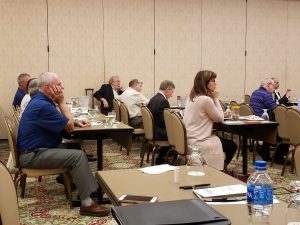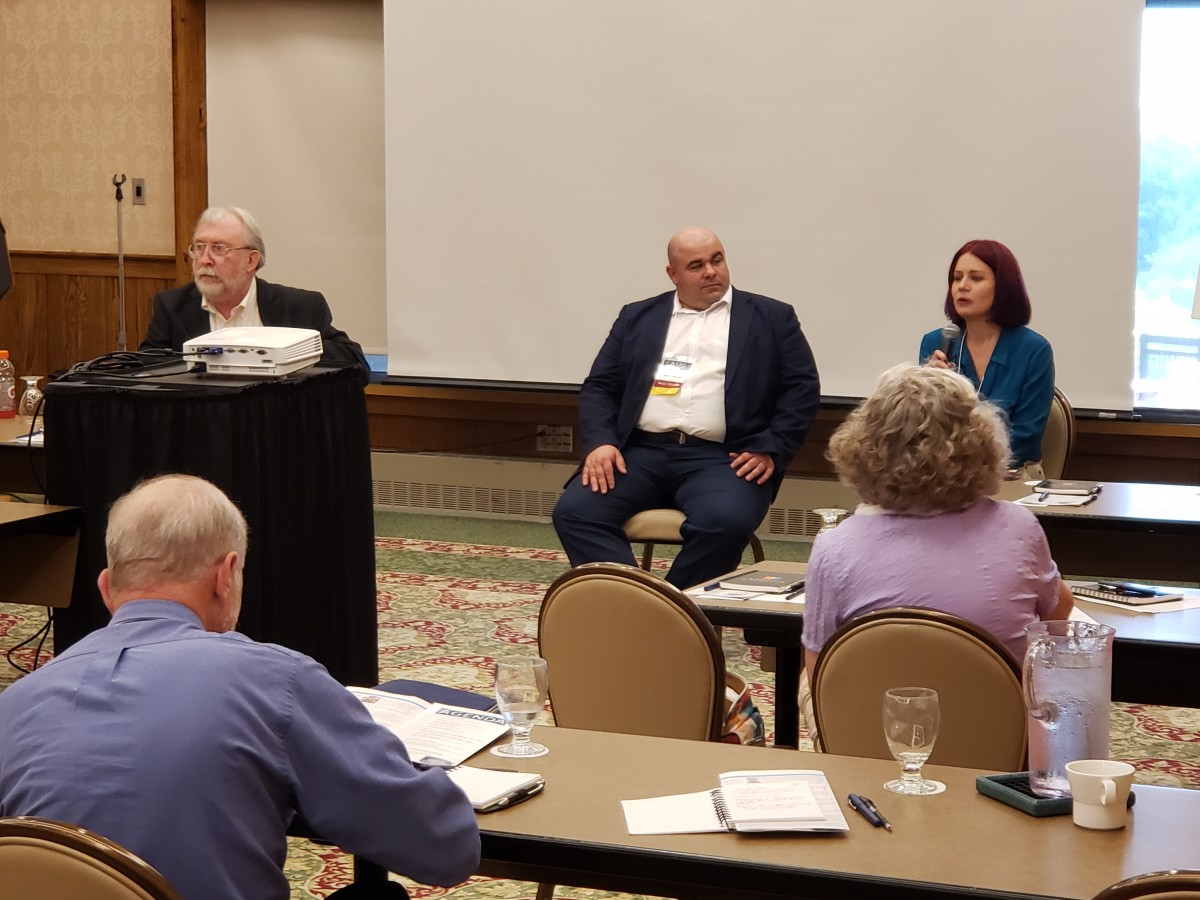WHEELING — Three mineral and surface owner advocates gave natural gas royalty owners a look on Saturday at past and future legislation affecting their land and leases.
 The owners were attending the National Association of Royalty Owners Appalachia annual conference, called Fueling the Future, at Oglebay Resort.
The owners were attending the National Association of Royalty Owners Appalachia annual conference, called Fueling the Future, at Oglebay Resort.
NARO President Valerie Antonette, Vice President Tom Huber, and West Virginia Surface Owners Rights Organization co-founder Dave McMahon all lobby at the state Capitol and talked about their successes and failures.
Antonette reviewed the fizzled HB 2866, which aimed to allow mineral owners to gain release from inactive leases so they could sign new ones and get their minerals back into production. It set up a notification process leading to an affidavit of termination.
“I thought it would be a relatively easy bill to pass, but it was not,” she said. West Virginia has no law requiring producers to grant releases unless it’s in the contract. So she based her bill on Pennsylvania law that spells out the process.
She even enhanced the Pennsylvania model, she said, by adding provisos to protect the operators’ legal rights in case of court disputes.
The bill passed the House 96-4, she said, but died in Senate Judiciary following a heavy industry lobbying onslaught. Many operators want to hang onto old leases in order to take advantage of future shale production. “We’re going to try it again next year.”
One of the NARO members suggested that the new bill contain a specific minimum production threshold that would trigger a lease release. The current threshold, “paying quantities” is too vague to mean anything since mineral owners have no access to what it costs to maintain an inactive well.
McMahon cautioned that setting a specific amount could backfire as technological changes make the number outdated.
Huber talked about the failed HB 2802, the Uniform Partition of Heirs Property Act. It dealt with partition suits for oil and gas mineral estates. It was designed to encourage some good-faith intra-family negotiation before court proceedings, and to protect mineral owners from companies that buy up small slivers of mineral tracts and force the sale of the entire tract.
“I suspected it would not get very far in the Senate,” he said. It didn’t, though it had overwhelming House support. “We thought we came to an agreement with industry,” but that turned out not to be the case.
So that bill will come back, he said. He’d also like to see a bill requiring state inspection of meters on gas wells, to make sure they’re calibrated properly.
NARO and the West Virginia Royalty Owners Association, which Huber leads, did see success in joining the opposition to the intermediate court of appeals bill.
NARO and WVROA, he said, don’t want another court layer to drag out lease and royalty disputes for more years.
They also opposed the change from two panels — a north and south — to a single panel appointed by the governor. A northern panel could have sped shale-gas disputes a bit. And they didn’t like the idea of gubernatorial advisor Bray Carey, an EQT board member who’s running the governor’s office, having a strong say over who’s appointed.
McMahon saw three bills to provide money to plug orphan wells die unexpectedly when success seemed certain. They will also rise again.
SB 665 set up a process and fee structure for expedited horizontal gas well permitting. But a couple industry lobbyists — as reported on the Senate floor on the last day of the session — undermined negotiations and killed it. The bill devoted half of the fee income to the Department of Environmental Protection and half to orphan well capping, with everything above $1 million going to capping.
HB 2779 provides a means for royalties due to unknown or unlocatable mineral owners to be transferred to the Oil and Gas Reclamation Fund after seven years. It passed the House but died in the Senate based on a misunderstanding of how it would affect surface owners’ income.
HB 2673 dealt with low-producing wells and substituted a 2.5% fee on their production for the 5% severance tax, with the revenue going to well plugging. It passed both houses but the governor vetoed it, fearing it would harm general revenues.
Looking ahead, McMahon said he’s been pushing for years, with no movement so far, for a bill to provide more protection for surface owners from well pad dust, noise and light; and for a Land Reunion Act to require notification to surface owners when the minerals beneath them are subject to tax sale.
He’d also like to see a bill requiring more equitable compensation to landowners who have tracts subjected to eminent domain for pipeline construction. If the pipeline company takes their meadow, he said, they should be paid based on the value to the company, not on the value as an empty meadow.
He also hopes that his Orphan Oil and Gas Well Prevention Act will gain some traction next session. It modernizes new well bonding requirements to generate money to plug orphan gas wells.
TWITTER @dbeardtdp Email David Beard at dbeard@dominionpost.com




